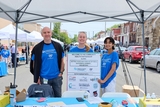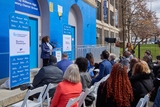Community Impact

At Children’s Hospital of Philadelphia (CHOP), we know that improving the health of children means going beyond the walls of our hospital and into the communities we serve. We have contributed more than $580 million and thousands of volunteer hours toward sustainable programs that improve the lives of children.
Our goal is to have a positive impact on a wide range of issues affecting the health and well-being of children in our community. These include food insecurity, asthma, opioid abuse, gun violence, homelessness, child literacy, trauma and more.
Our work has been recognized with awards from the Philadelphia Foundation, the Environmental Protection Agency and the Hospital and Healthsystem Association of Pennsylvania.
The following video highlights how we’re responding to our neighbors’ needs.
A commitment to our community
We manage many activities that support CHOP’s strong commitment to the health and wellness of children and families in our community.
- Find out how Healthier Together helps children and families in West and Southwest Philadelphia live their healthiest lives.
- Read our 2022 Community Impact Report to learn how our programs are helping kids throughout the nation and around the world. Our previous years’ reports can be read here.
- Download CHOP's Community Health Needs Assessment (CHNA) report and implementation plan to find out more about the health needs in our community and our strategies to address these needs.
- Learn more about the CHOP Cares Community Fund, which provides small grants to our employees to support their work in the community, helping to fill needs identified in the CHNA.
- Meet the Community Advisory Board, CHOP employees and civic leaders who support the philanthropic and volunteer efforts of our employees through the CHOP Cares Community Fund.
We continuously look for opportunities to promote CHOP’s mission and support our local communities.
If you would like us to attend, present or host a table at an upcoming health fair in your community, please complete this form.
distributed in Primary Care and the Emergency Department
given to families across West Philadelphia
of medication safely disposed in drug take-back bins

Better Together: Implementing change in our communities
Learn how CHOP is addressing the health needs of children and families throughout the region in our Community Impact Report.

Our resources
This list of resources provides more information about our work in the community and the ways we are supporting children and families.
Our team works to expand and develop initiatives that meet the needs of children in our communities. We bring a community perspective to hospital projects, programs and policies and represent CHOP at community events.


Community Impact in the news
News about CHOP's impact on the communities we serve.